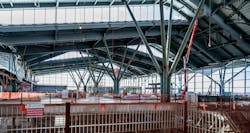An Up-Close Look at PIT’s Construction Progress
Pittsburgh International Airport’s $1.57 billion construction project has officially eclipsed the 60% completion mark.
The project includes a unique bridge and tunnel experience – inspired by Pittsburgh’s Fort Pitt Tunnel and bridge experience – linking the new terminal to airside concessions, amenities and gates. A functional element such as this reflects the architectural philosophy guiding the new airport’s design. The connector bridge opens to reveal a modernized center core atrium with new concessions to be added.
The new terminal’s improved passenger experience will include cutting the time from curb to gate in half, a vastly expanded security checkpoint with more lanes – including one dedicated for families – faster baggage delivery times, additional covered parking with technology guiding patrons to the nearest open space, and airfield observation areas among other upgrades. The new terminal will also feature a more seamless international arrivals process.
“What you’re going to experience here is really new,” said Executive Vice President and Chief Development Officer Paul Hoback.
The airport modernization has had a massive impact on the regional construction industry – creating direct and indirect jobs throughout the region.
“The legacy that jobs like this create… There’s a lot of other things happening that are very important to our industry, and this project is providing them,” said Jeff Turconi, executive vice president at construction management partner PJ Dick.The project is an economic dynamo for Western Pennsylvania, generating a total of approximately 14,300 direct and indirect jobs and $2.5 billion in economic impact. No local or state tax dollars are being used to fund the new airport’s modernization, and about 90 percent of the materials and services needed for it have been locally sourced.
More project goals are being met daily as construction enters its peak phase in preparation for the new airport’s opening in 2025, an exact date to be determined.
“We’re going to control our own destiny. We’re going to make sure all of our people are trained – the buildings tested, commissioned and everything is ready for opening day,” Hoback said.
A first test of the state-of-the-art baggage handling system was recently conducted. This system will improve the passenger experience by significantly reducing baggage wait times. Final placement of the new terminal’s glass, a featured design element, is also expected to occur within weeks.
“There is a lot of work still left to do,” Hoback said. “This is a new airport that is going to transform the industry, transform our region and truly be that front-door entrance that the people of Pittsburgh deserve.”
Airlines at PIT have unanimously supported the new terminal program. The project is funded mostly through long-term bonds that the ACAA will pay back from its operating revenue, most of which is paid by the airlines through rates and charges.
No local or state tax dollars are being used to pay for the project, which has been awarded $28.8 million in federal grants under the Bipartisan Infrastructure Law. The law includes funding for national critical infrastructure, such as airports.
The new terminal was designed with the passenger experience in mind, prioritizing modern, efficient infrastructure. The new airport will employ state-of-the-art technology and an innovative design intended to make the airport experience easier for travelers. A rolling roof design, prominent tree columns and outdoor terraces will bring Western Pennsylvania’s natural beauty to the airport.
Built as a hub for US Airways 32 years ago, the current terminal was built at a time when 80 percent of the total passengers were connecting and 20 percent were travelers heading to or from Pittsburgh. Today, 95 percent of the total passengers are heading to and from Pittsburgh and 5 percent are connecting.
With a current facility built for those connecting passengers, the current terminal has a cramped main checkpoint, eight miles of baggage belts, and insufficient parking with costly operations and maintenance.
